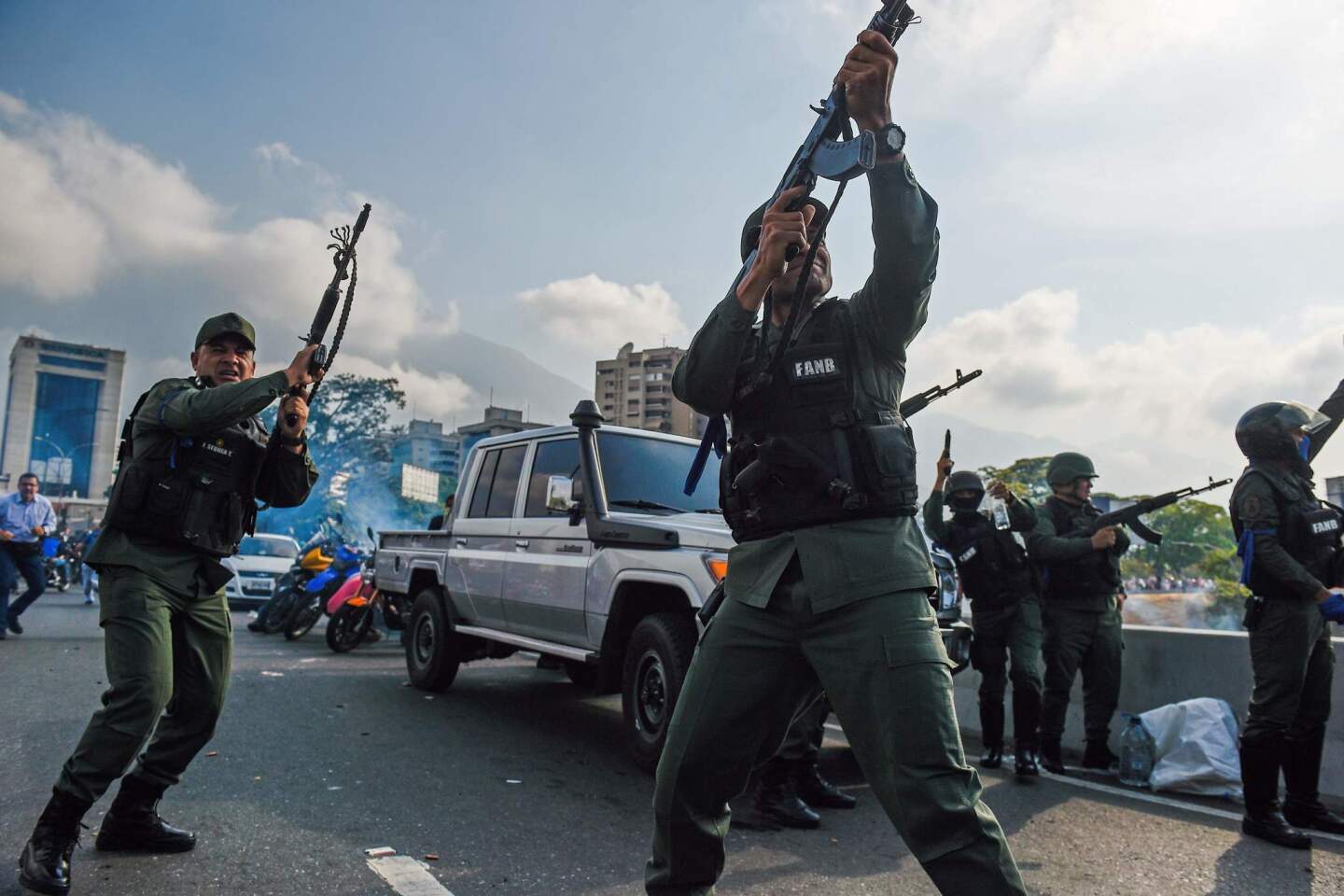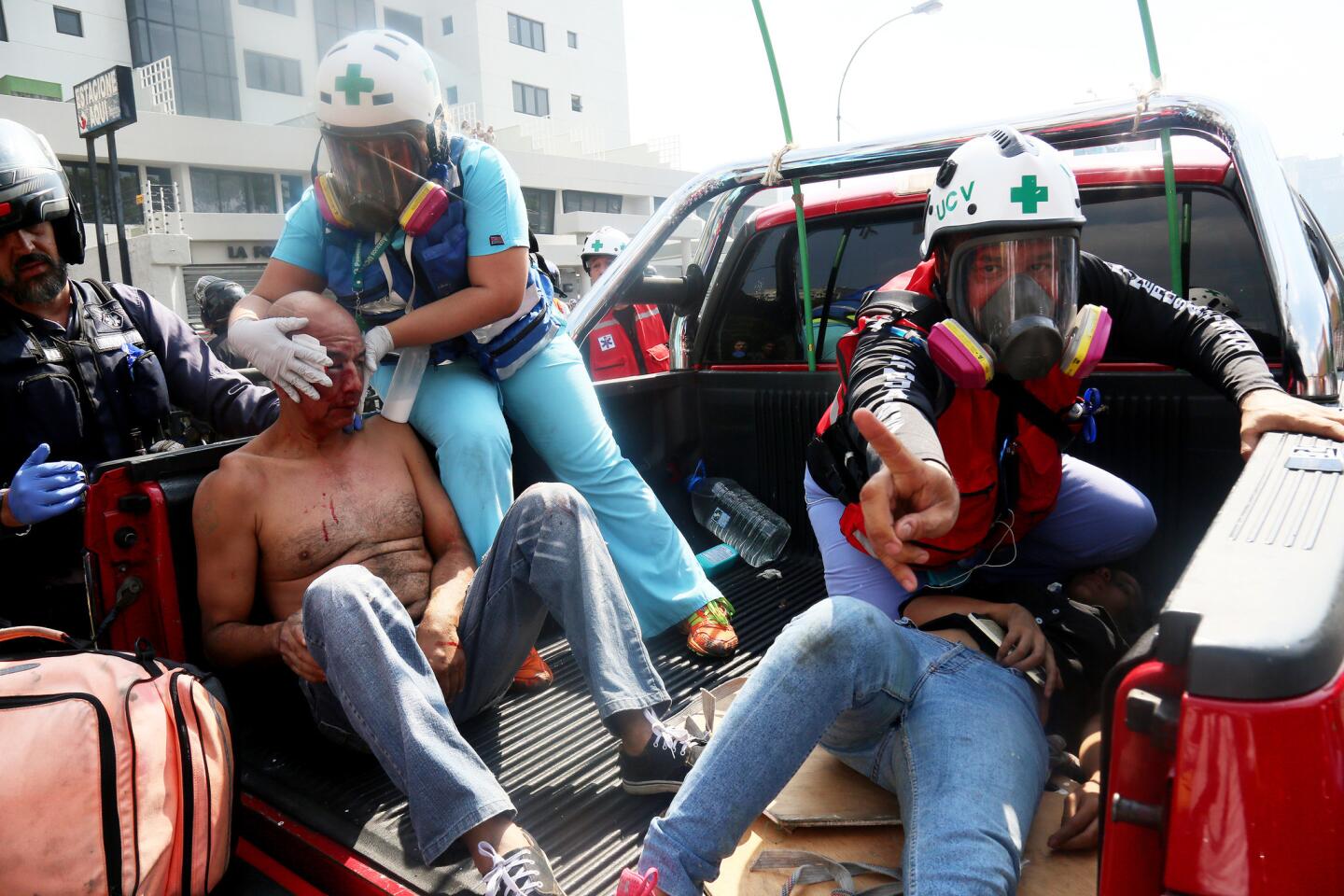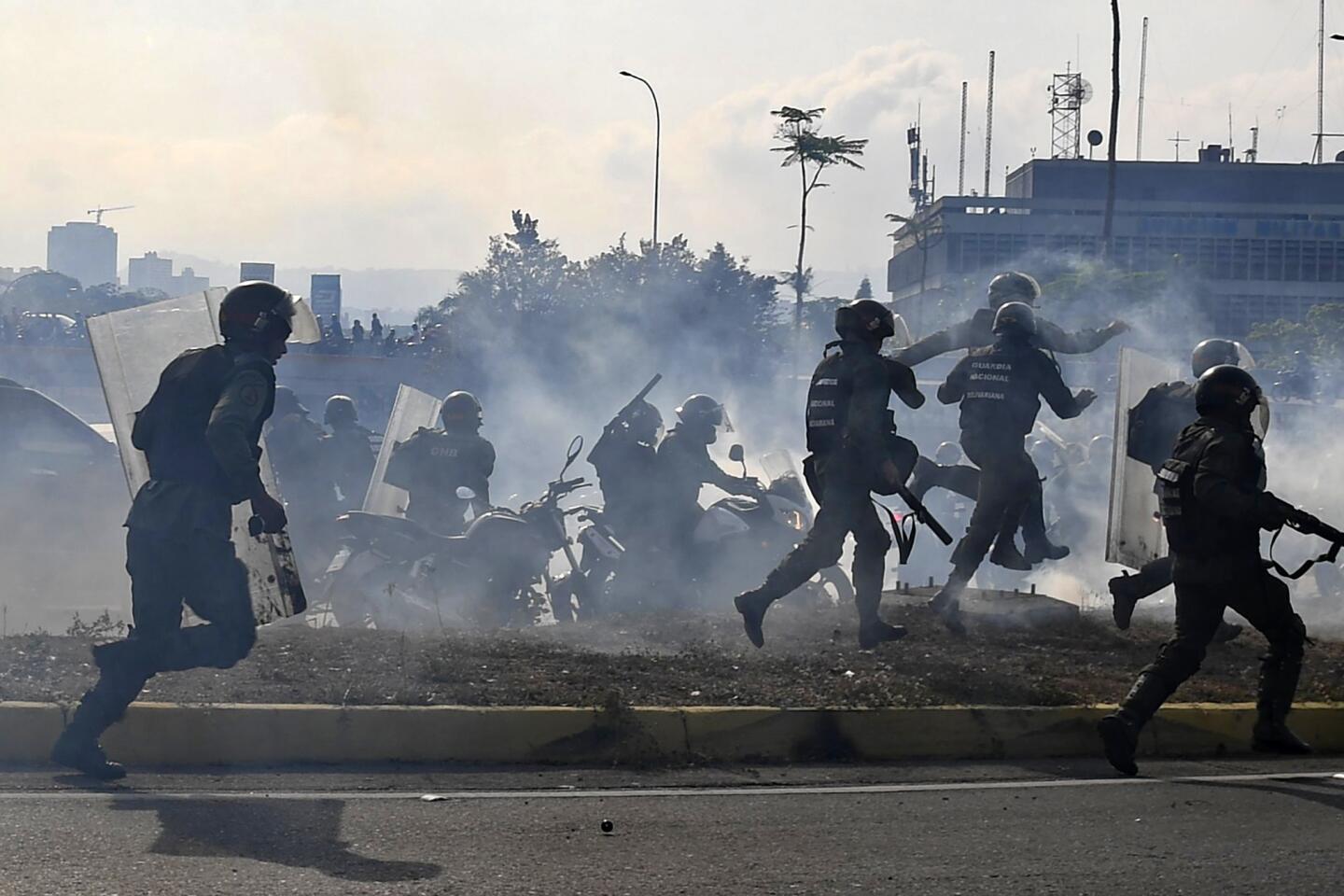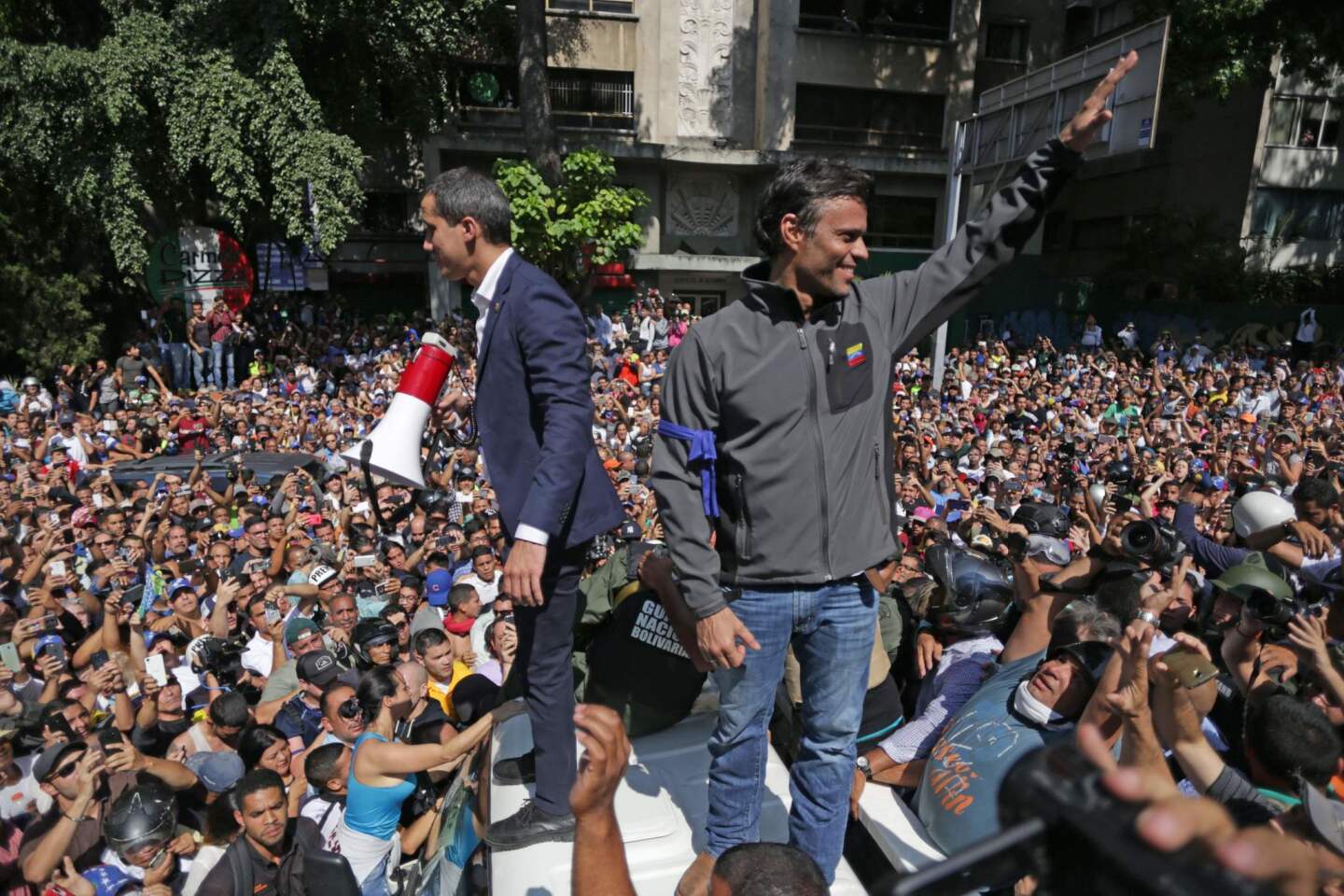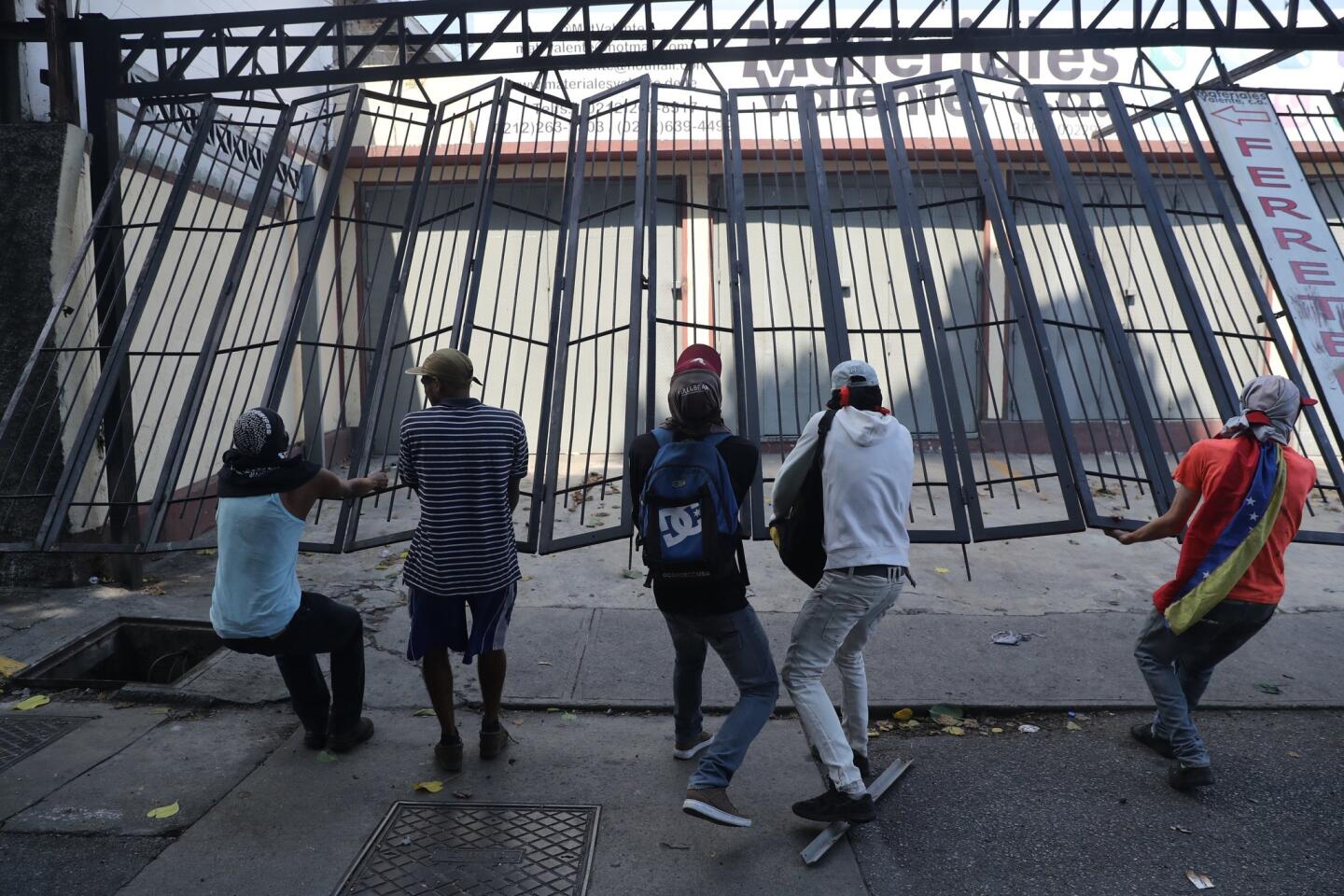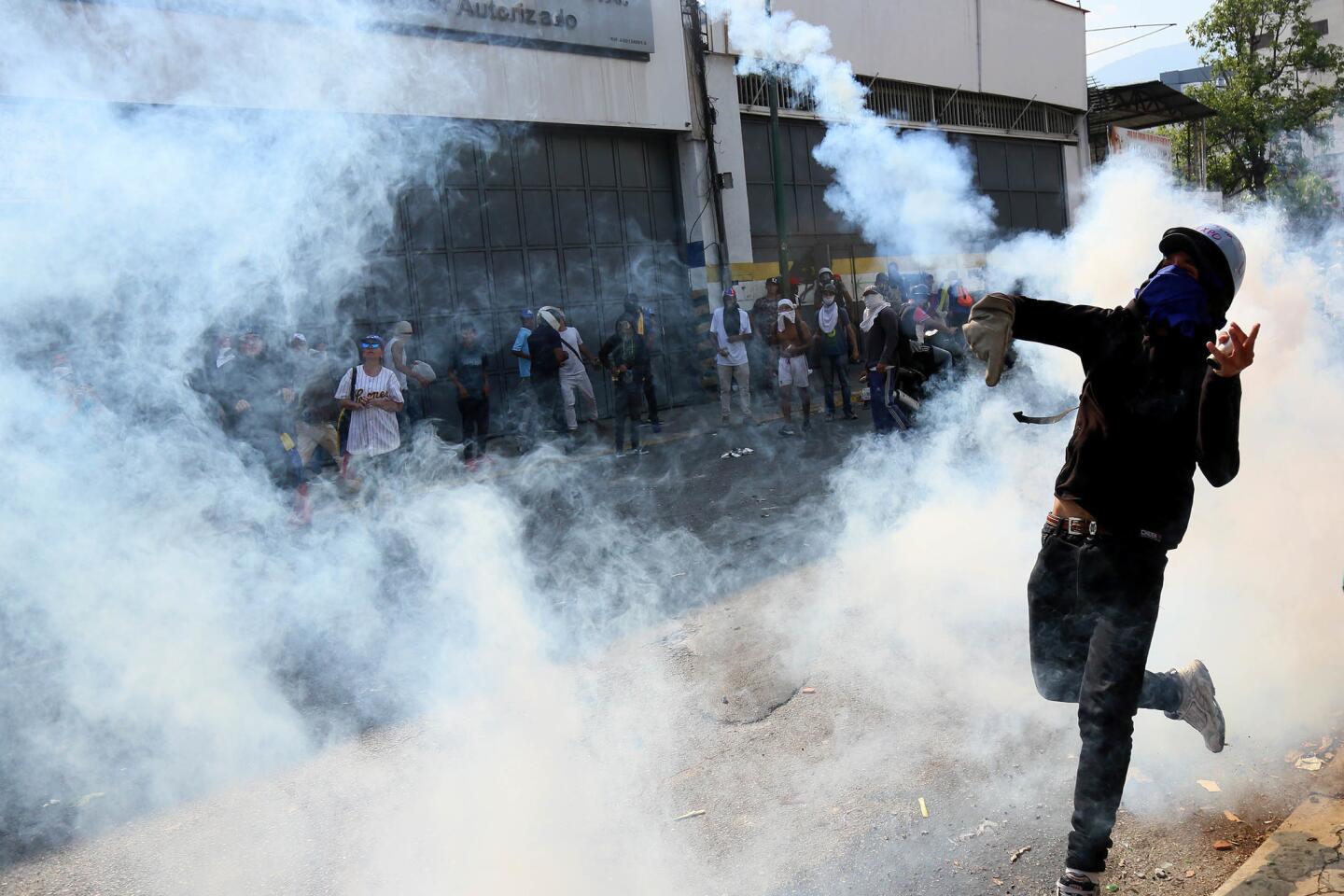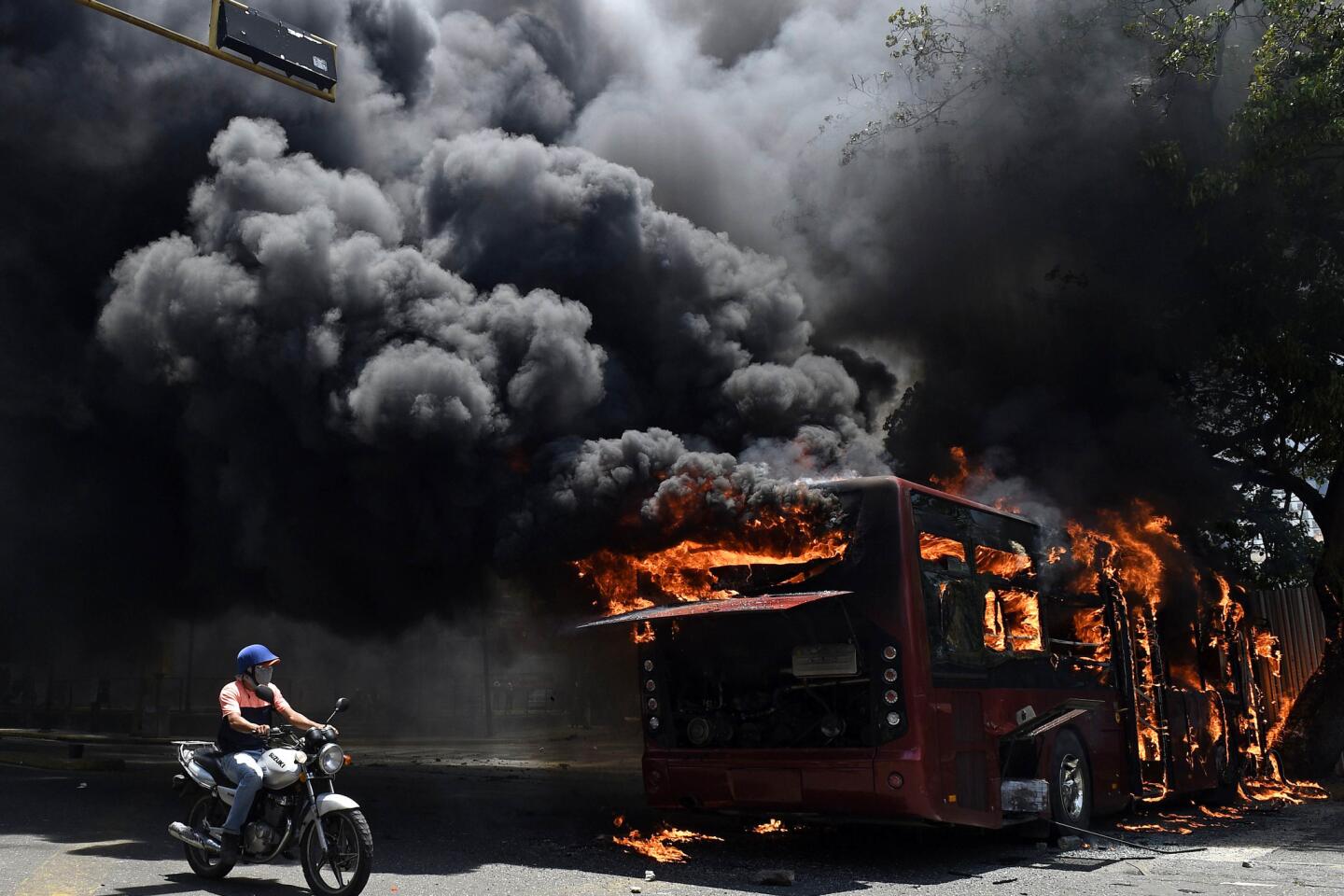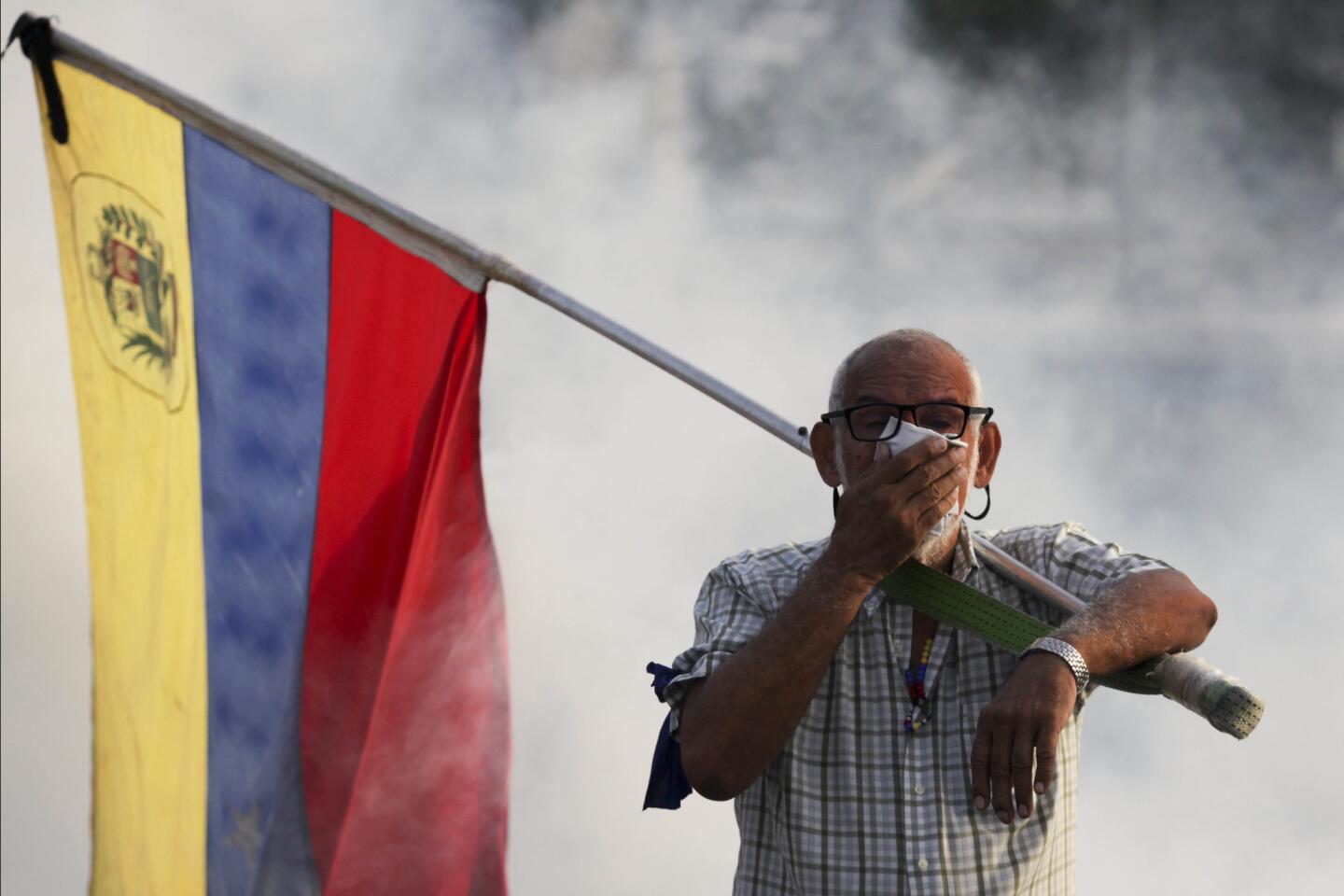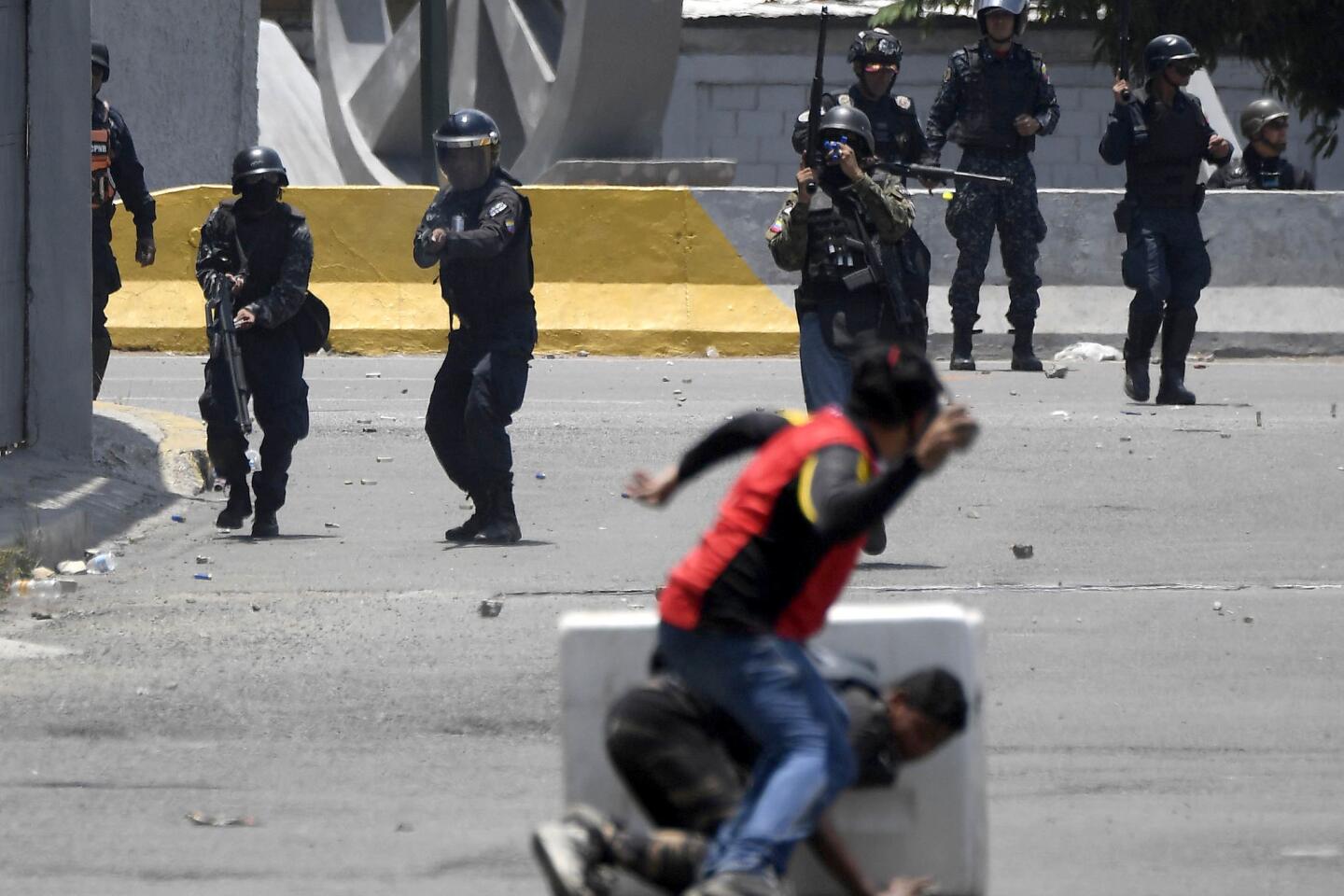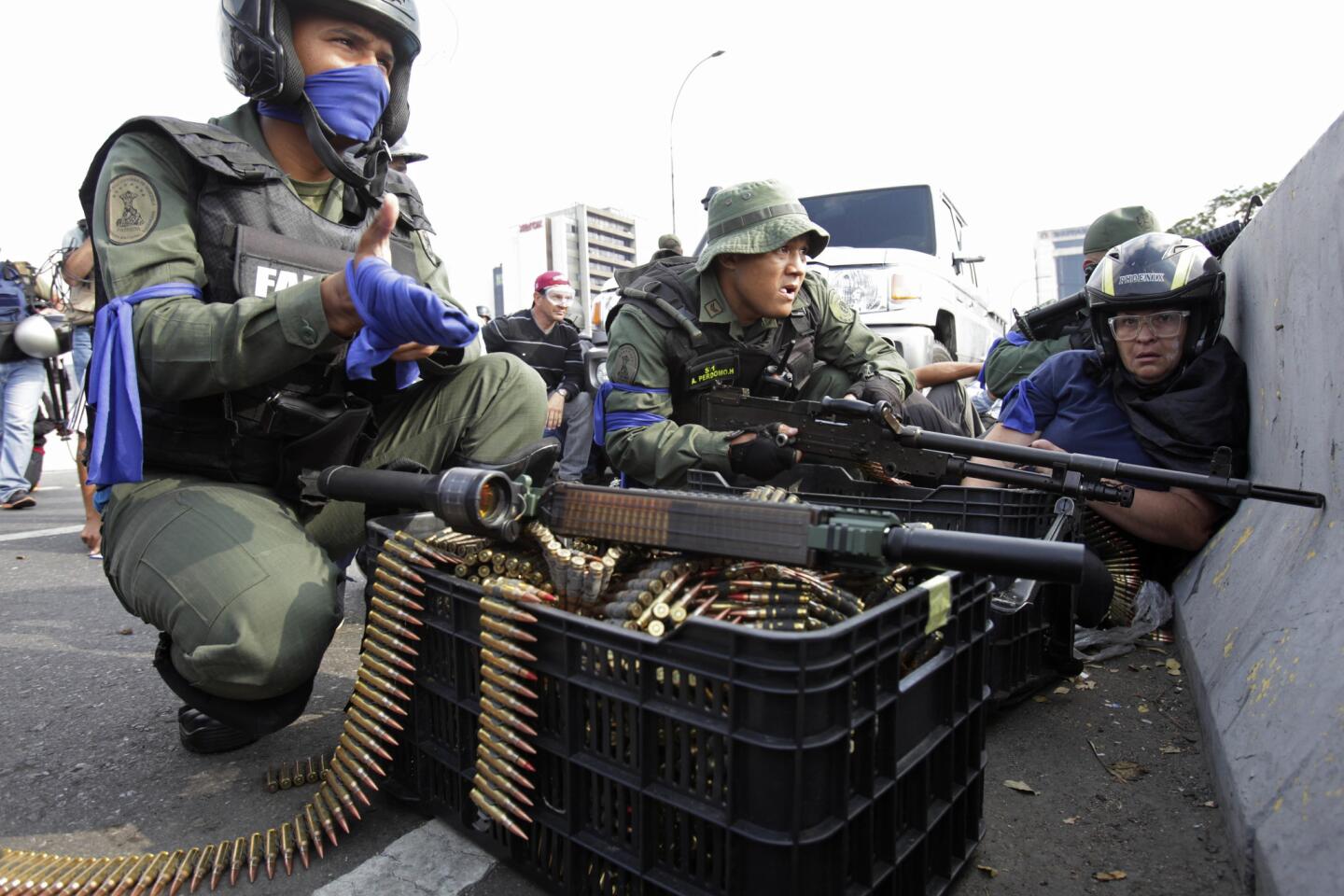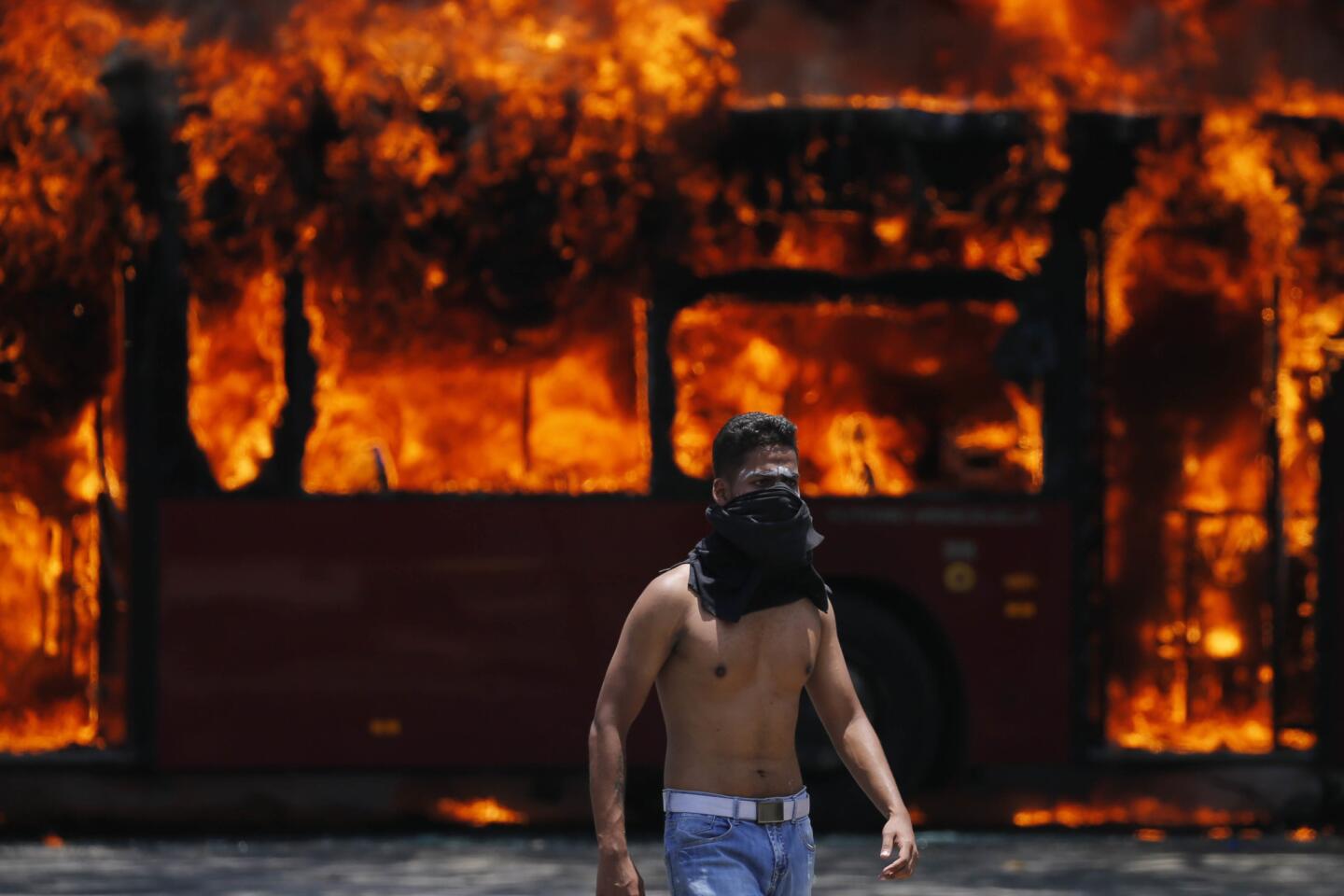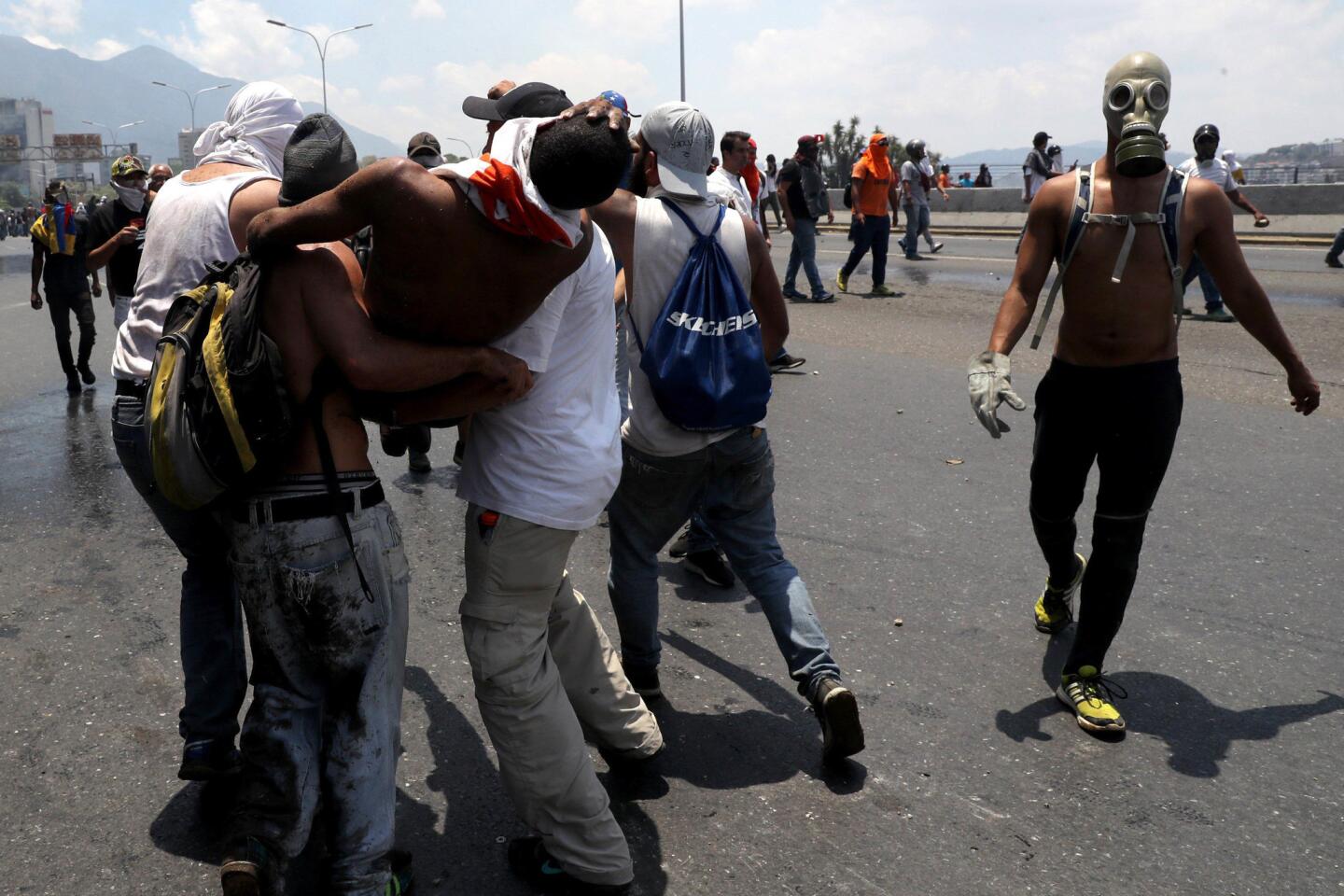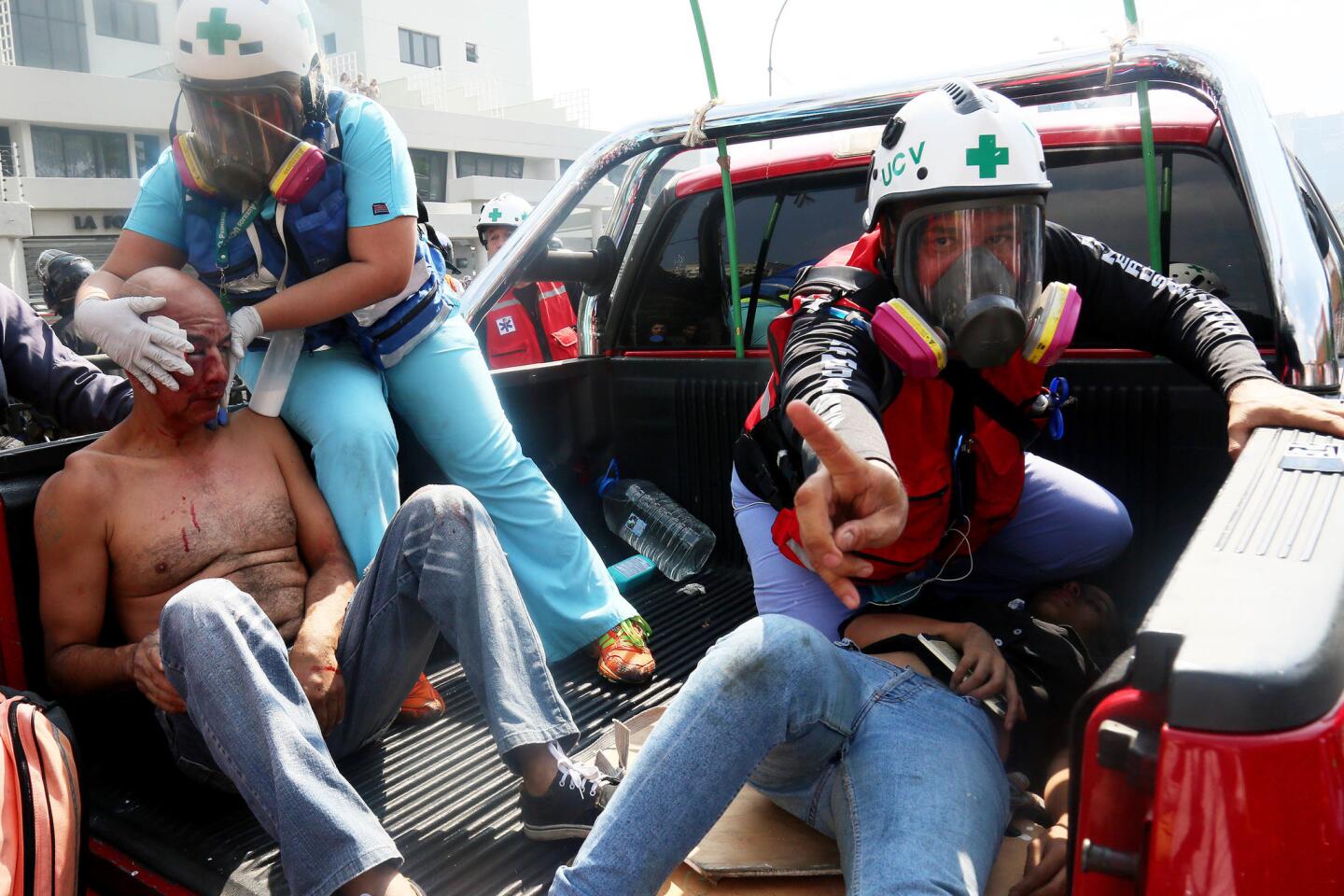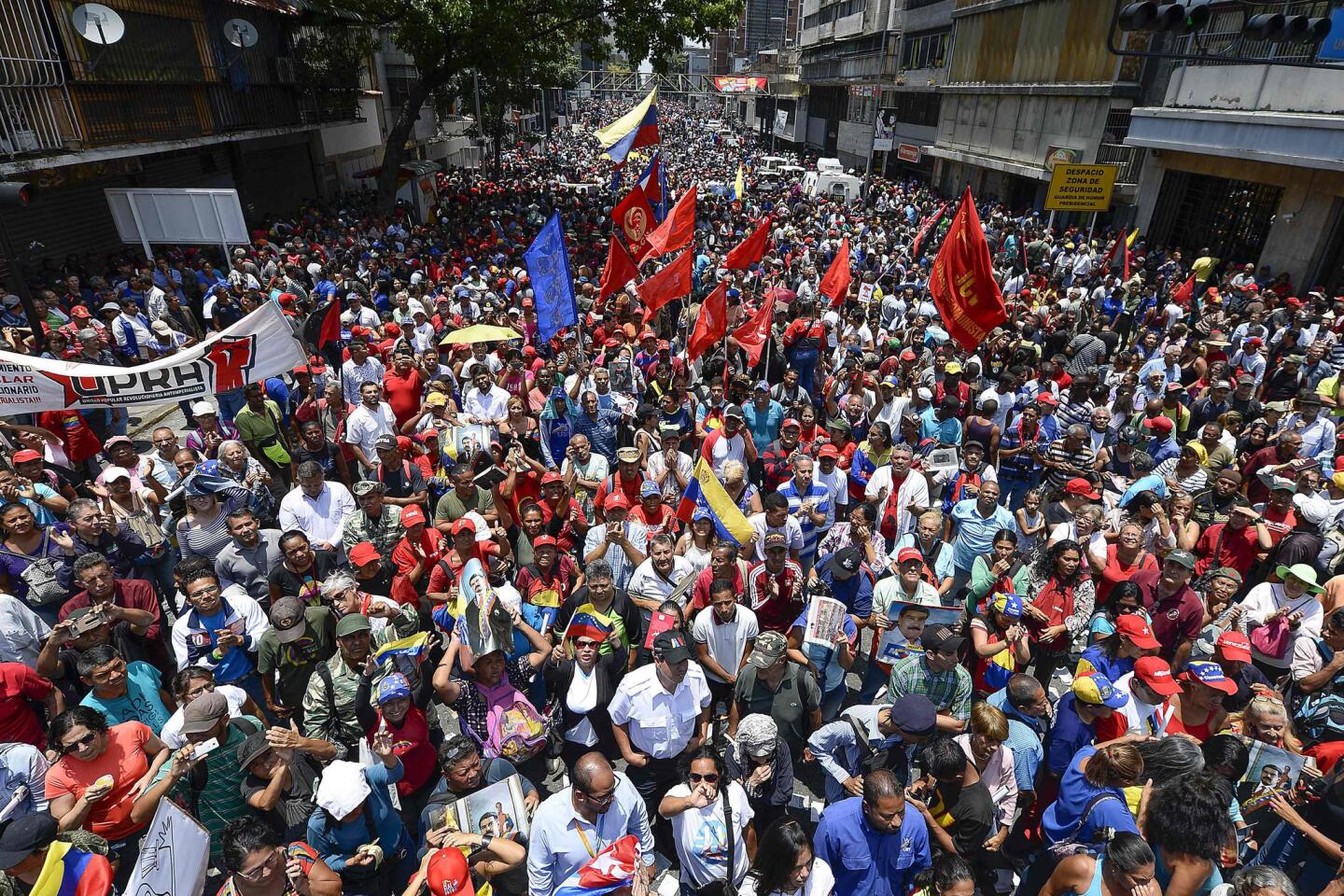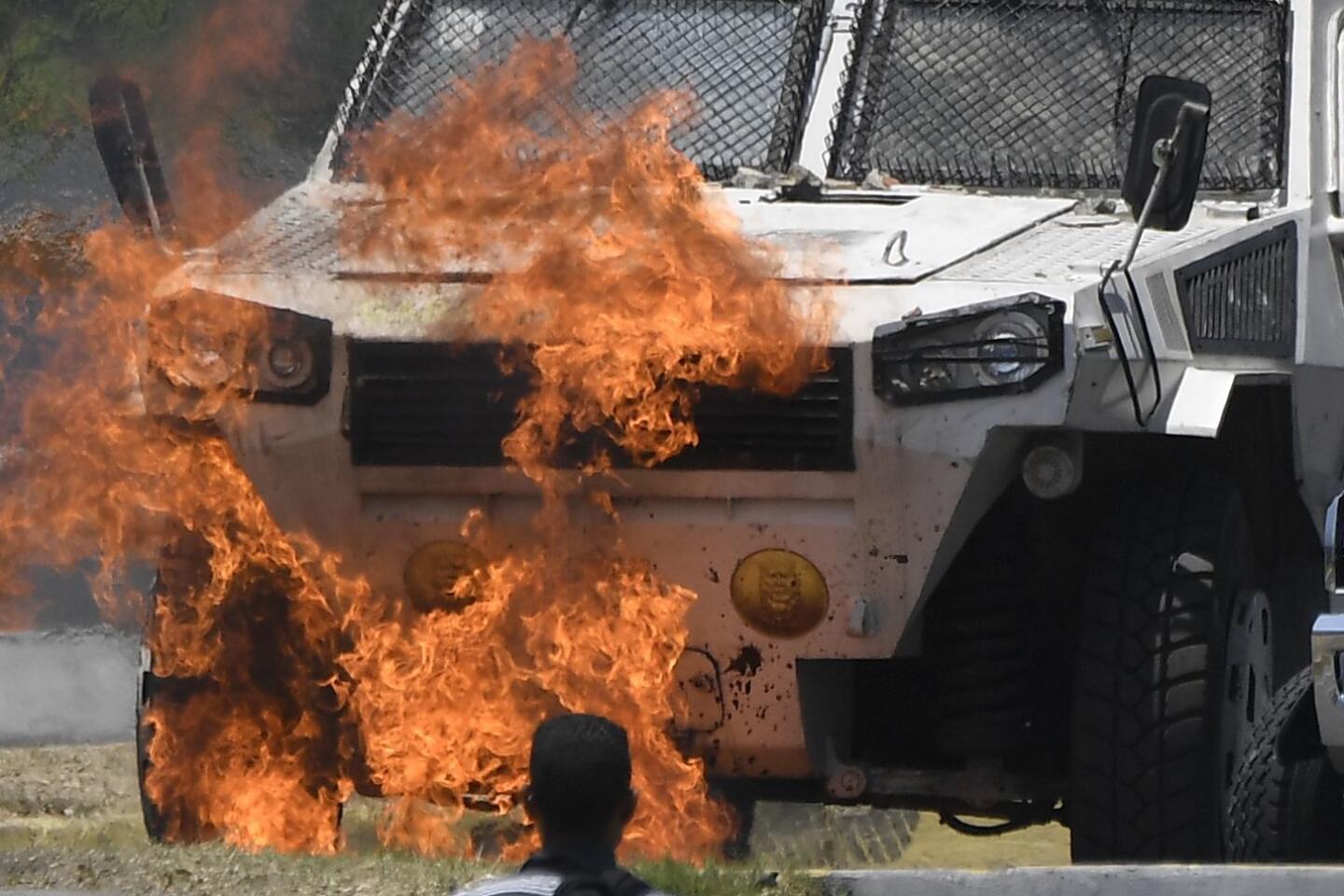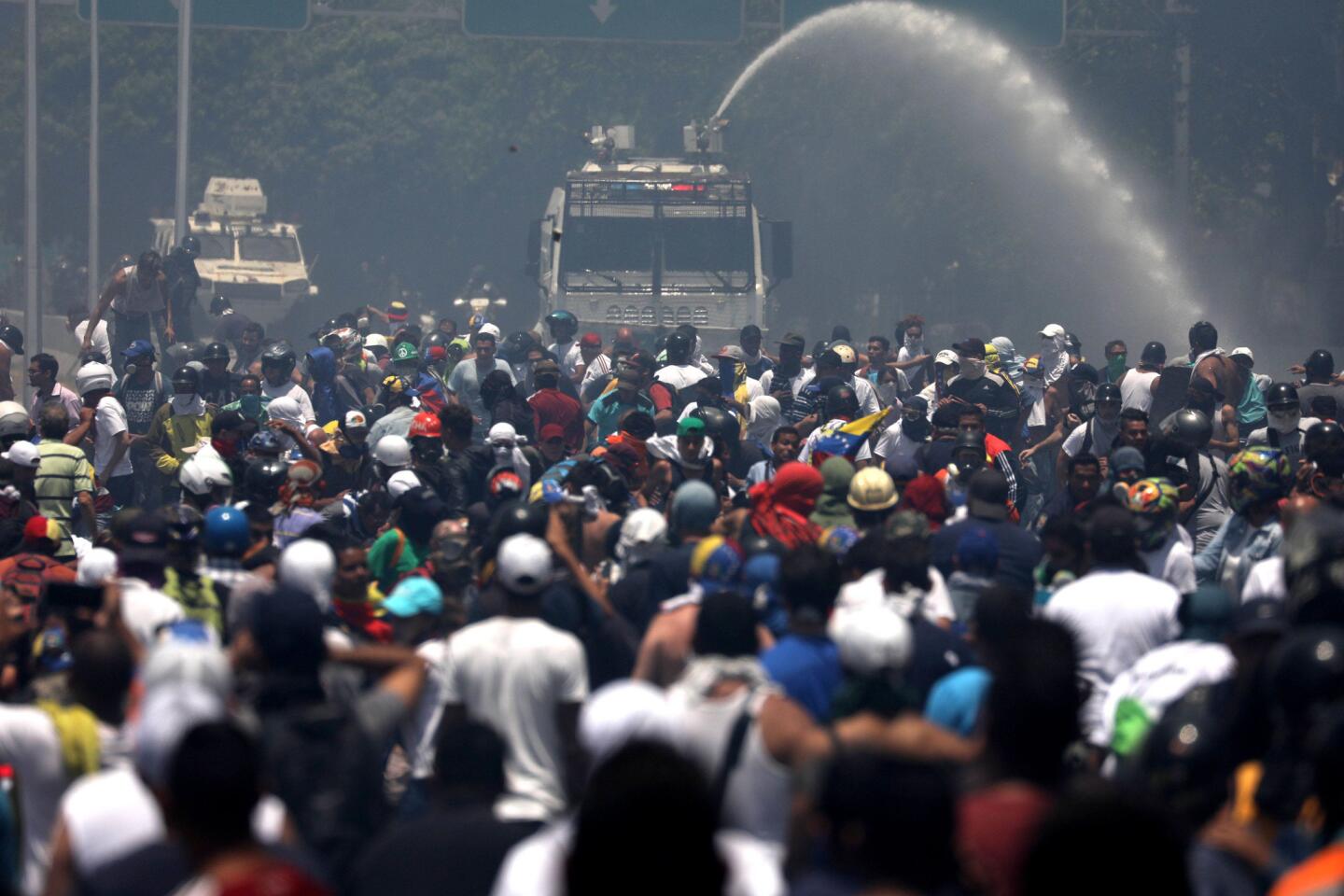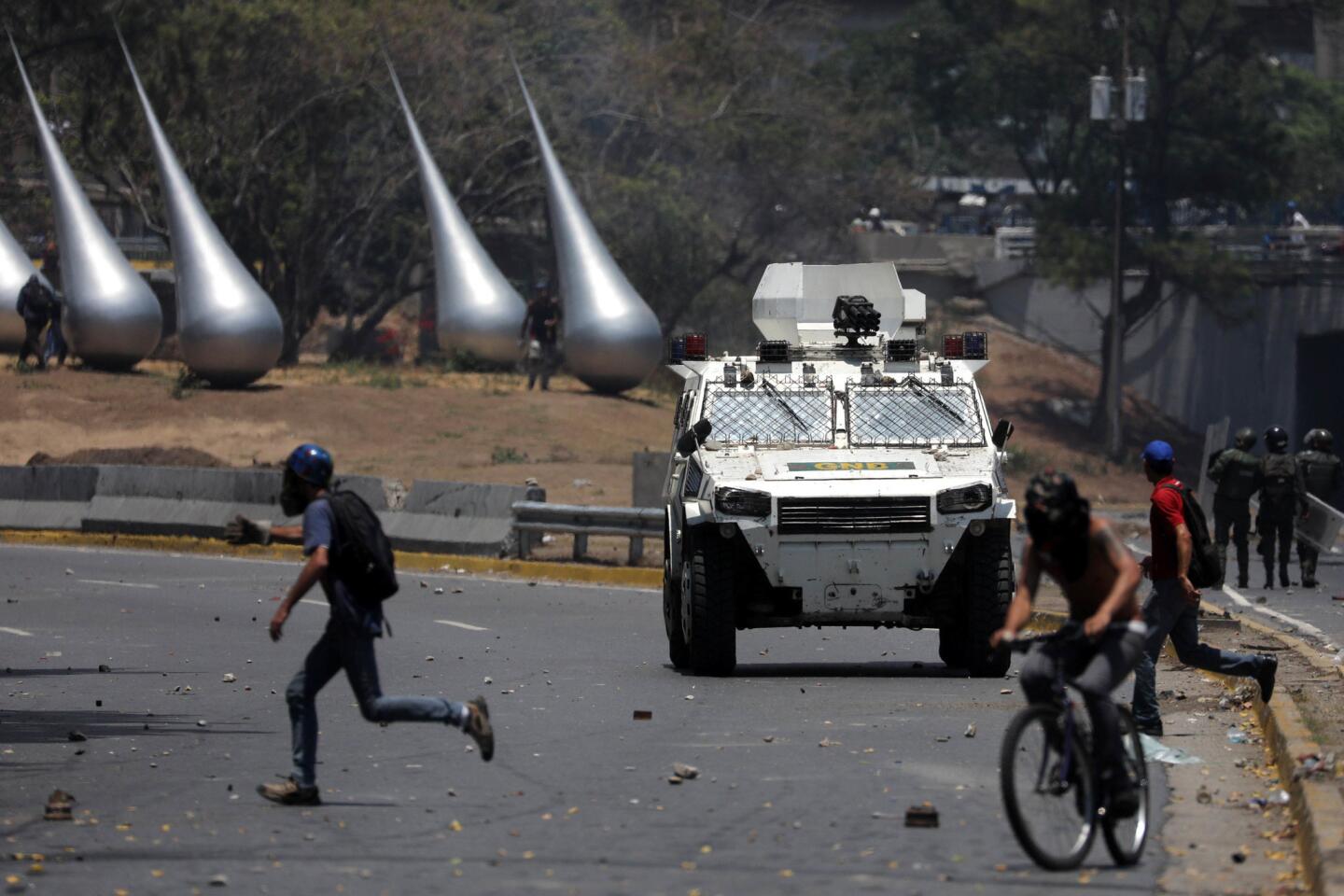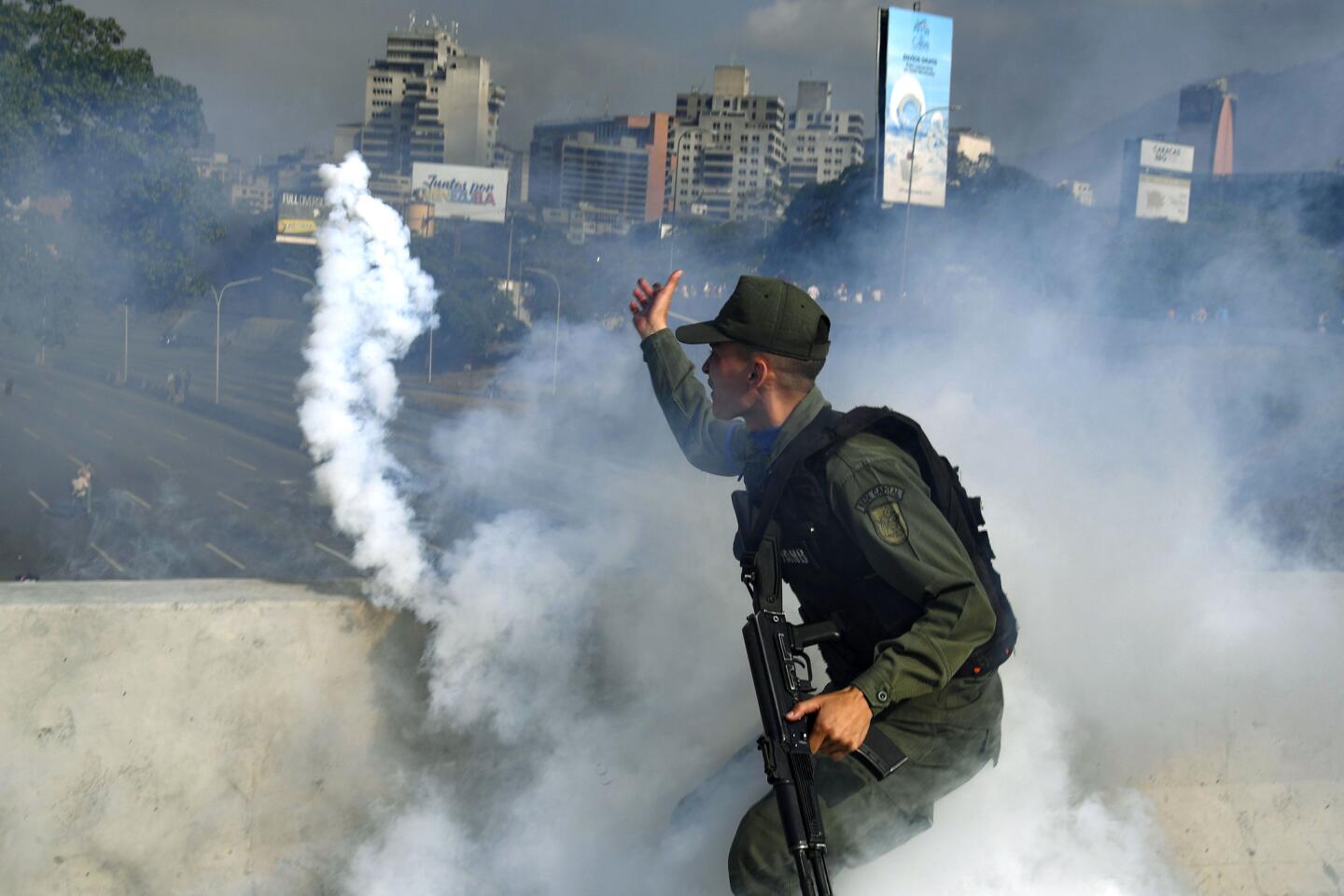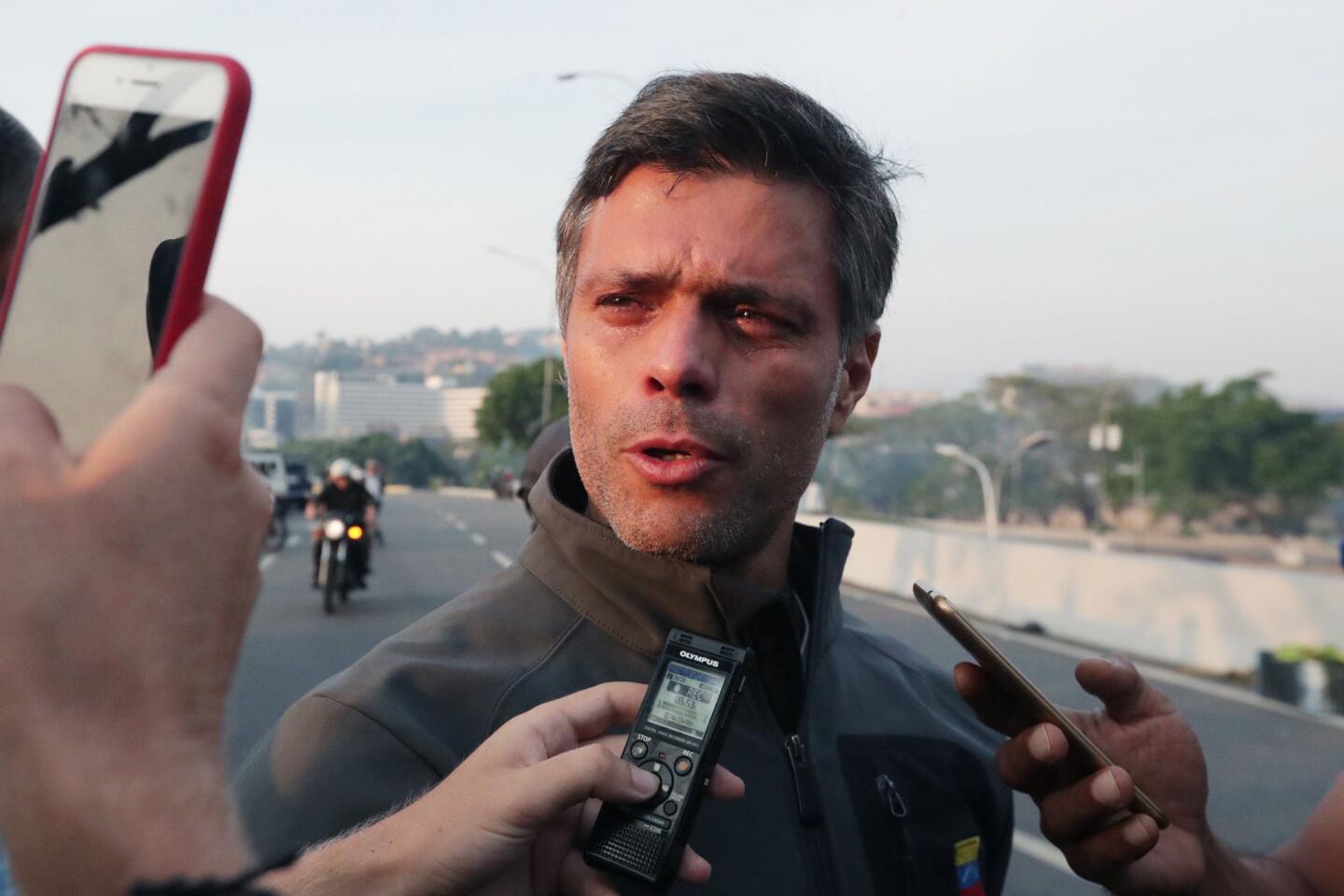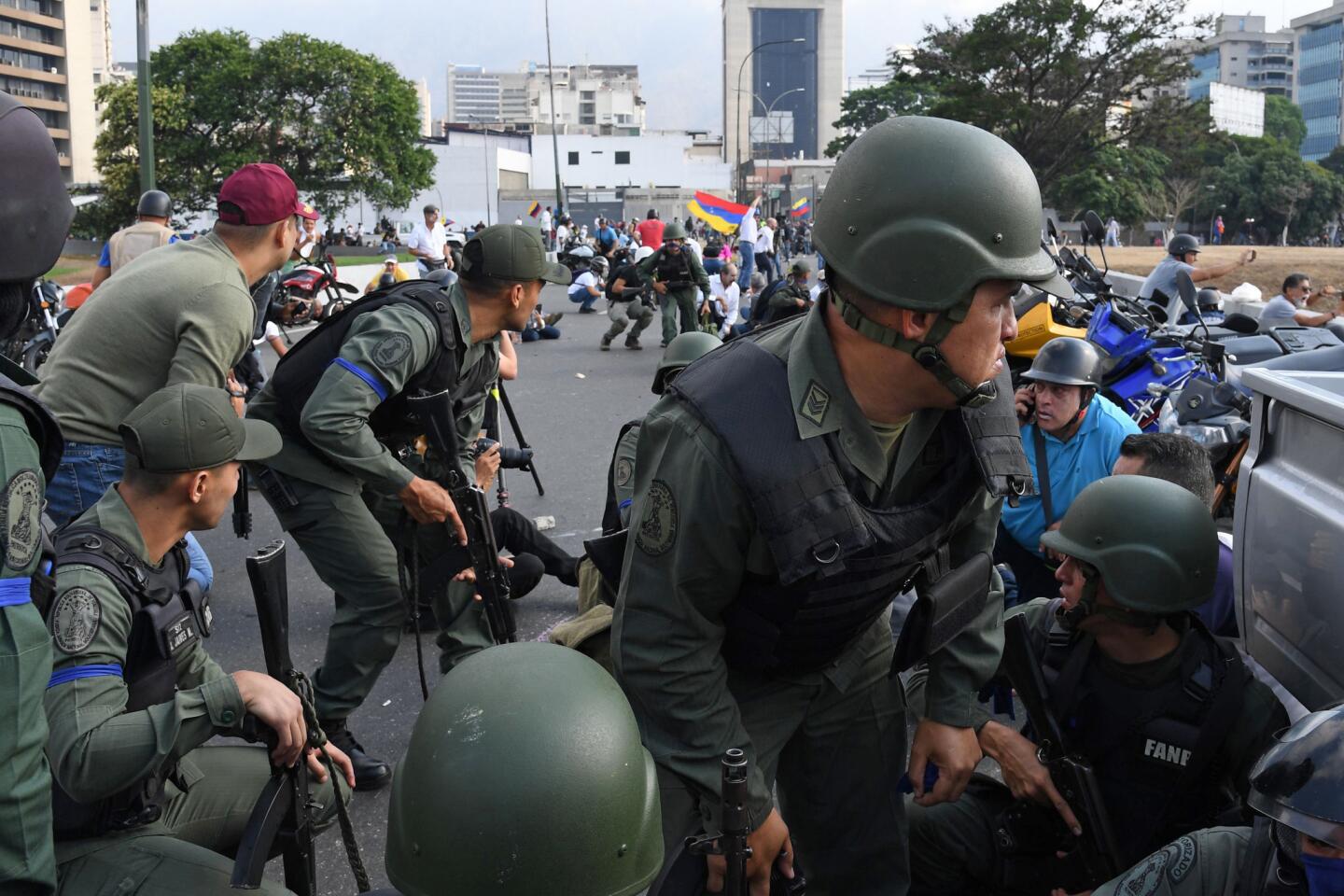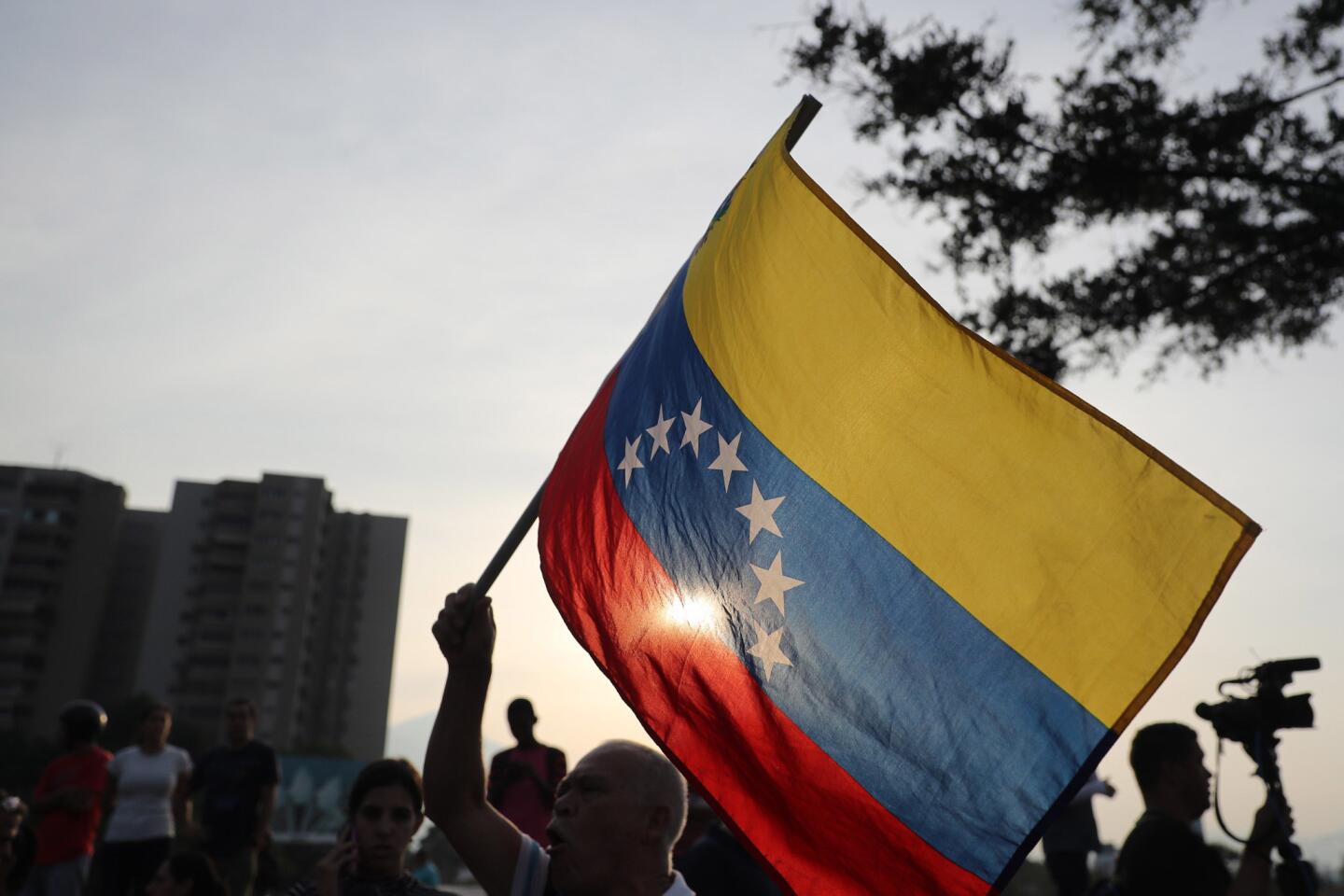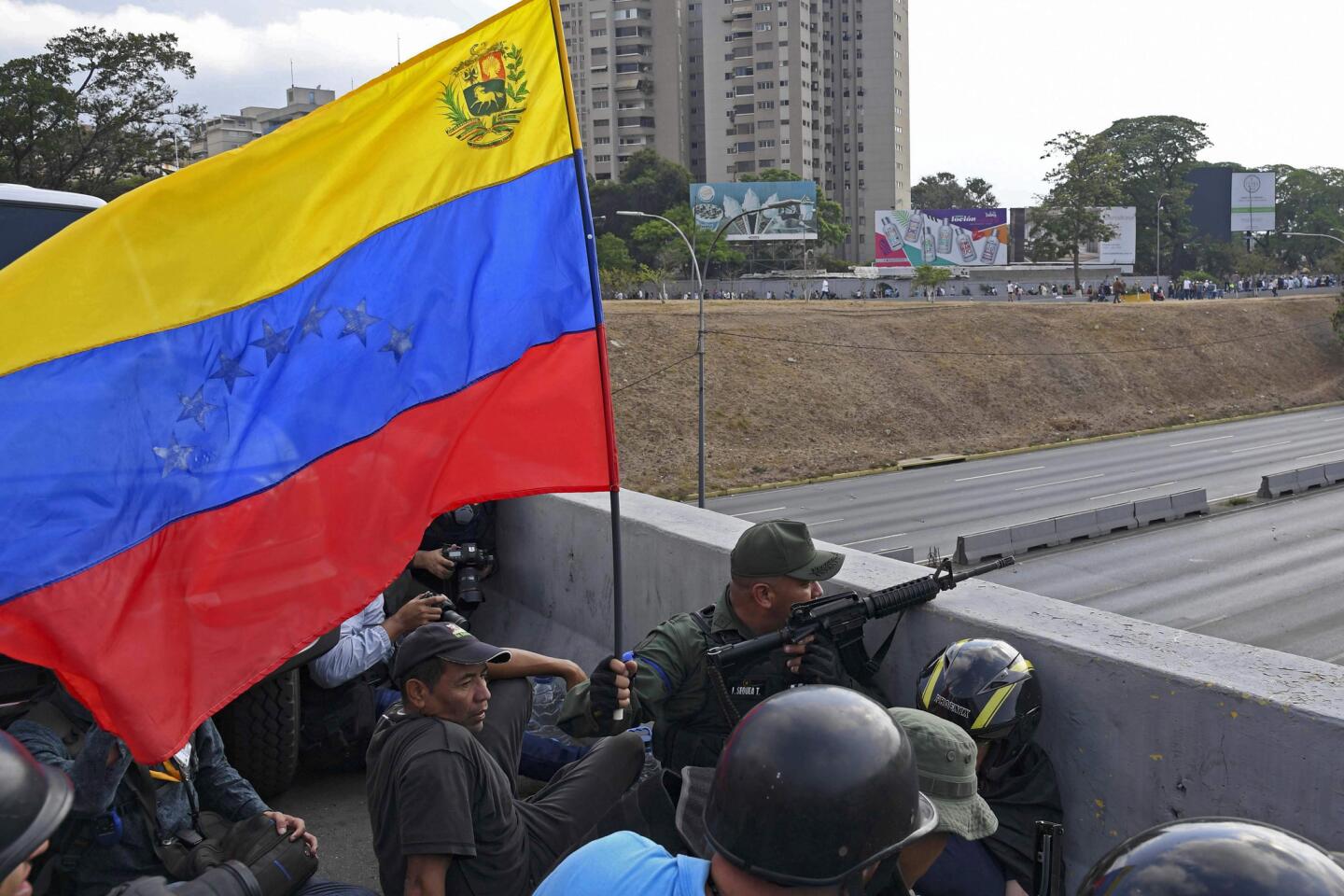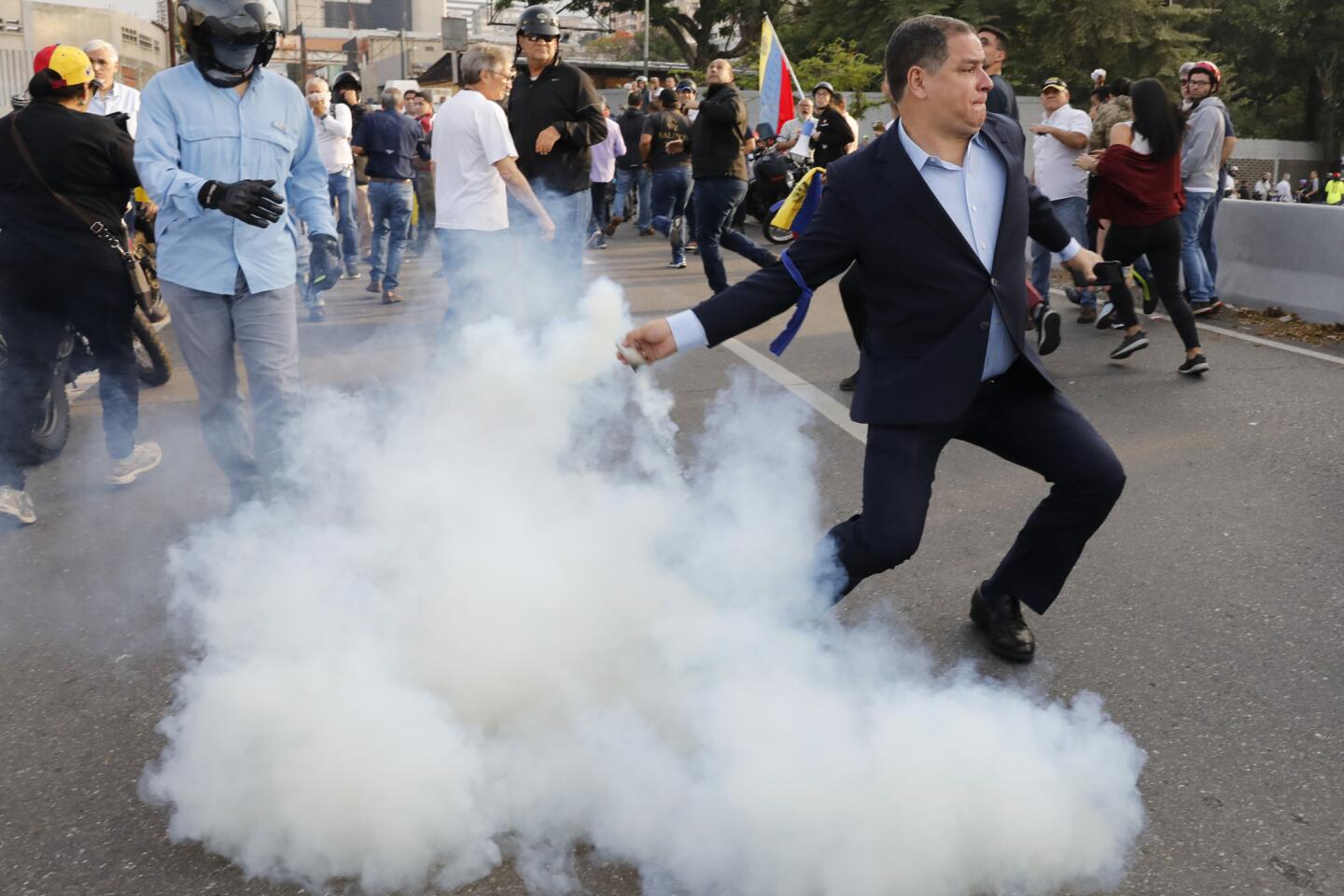Venezuela’s Guaido renews call for uprising against Maduro, who vows to fight
- Share via
Reporting from CARACAS, Venezuela — The political crisis in Venezuela deepened Tuesday as U.S.-backed opposition leader Juan Guaido issued fresh calls for the military to switch sides and protesters crowded the streets demanding the ouster of President Nicolas Maduro.
Throughout the day, clashes between protesters and government security forces battered Caracas, where gunshots were heard and tear gas drifted over parts of the capital.
Guaido, who had declared himself interim president months before, stood on a freeway near the main Caracas air force base and called on the armed forces to abandon Maduro. Guaido was flanked by uniformed military personnel wearing blue armbands.
The protest, which Guaido dubbed “Operation Liberty,” closed a key freeway the day before nationwide May Day protests planned against Maduro.
Later, atop a pickup truck in the Plaza Francia in the Altamira district of the capital, Guaido brandished a pair of megaphones and said: “Today it is clear that the armed forces are with the people and not with the dictator!”
He declared the “final phase” of the opposition’s years-long effort to topple Maduro, who has served as president since succeeding the late Hugo Chavez in 2013.
But by Tuesday evening, Maduro remained.
He appeared on state television and reiterated his position that the day’s events amounted to a U.S.-instigated coup against his government.
Maduro had declared early in the day on Twitter that he had spoken with military leaders nationwide, who vowed their “total loyalty to the people” and to the constitution. “I call for maximum popular mobilization to ensure the victory of peace,” he said. “Venceremos!” he added, using a popular revolutionary chant meaning, “We will triumph!”
His supporters rallied outside the presidential compound of Miraflores in Caracas. Government supporters denounced Guaido and his backers as “traitors” and vowed the government would not fall.
Late Tuesday, Guaido reiterated his call for Venezuelans to take to the streets. In a brief video statement released over social media, he called for a day of national protest Wednesday. He said that Tuesday’s events demonstrated Maduro’s lack of support among the military and that the socialist leader’s removal from office was inevitable.
Venezuela has been racked by years of political turmoil and economic chaos, and in January, Guaido, 35, declared himself interim president, saying Maduro’s 2018 reelection was illegitimate. He received wide international support.
In Washington, the Trump administration backed the opposition, portraying the protests as an effort to restore democracy — and not a coup, as the Maduro government has labeled it. Officials portrayed division and betrayal within the Maduro government, but some experts cast doubt on some of the assertions.
Secretary of State Michael R. Pompeo said Tuesday that Maduro had been planning to leave Venezuela but that he was dissuaded by Russia.
“He had an airplane on the tarmac, he was ready to leave this morning as we understand it, and the Russians indicated he should stay,” Pompeo said on CNN.
“He was headed for Havana,” Pompeo said, but would not provide the source behind his assertion.
Maria Zakharova, spokeswoman for the Russian Foreign Ministry, denied on CNN that Russia had persuaded Maduro to remain in Venezuela. Maduro, in his video, scoffed at Pompeo’s claim.
President Trump’s national security advisor, John Bolton, said key figures in Venezuela had told the opposition that Maduro had to go. He said those included Defense Minister Vladimir Padrino Lopez; Maikel Moreno, president of the supreme court; and Ivan Rafael Hernandez Dala, commander of Maduro’s presidential guard.
“It’s still very important for key figures in the regime who have been talking to the opposition to make good on their commitments” to support Guaido, Bolton told reporters outside the White House. He provided no proof of his assertion that the Maduro aides had turned.
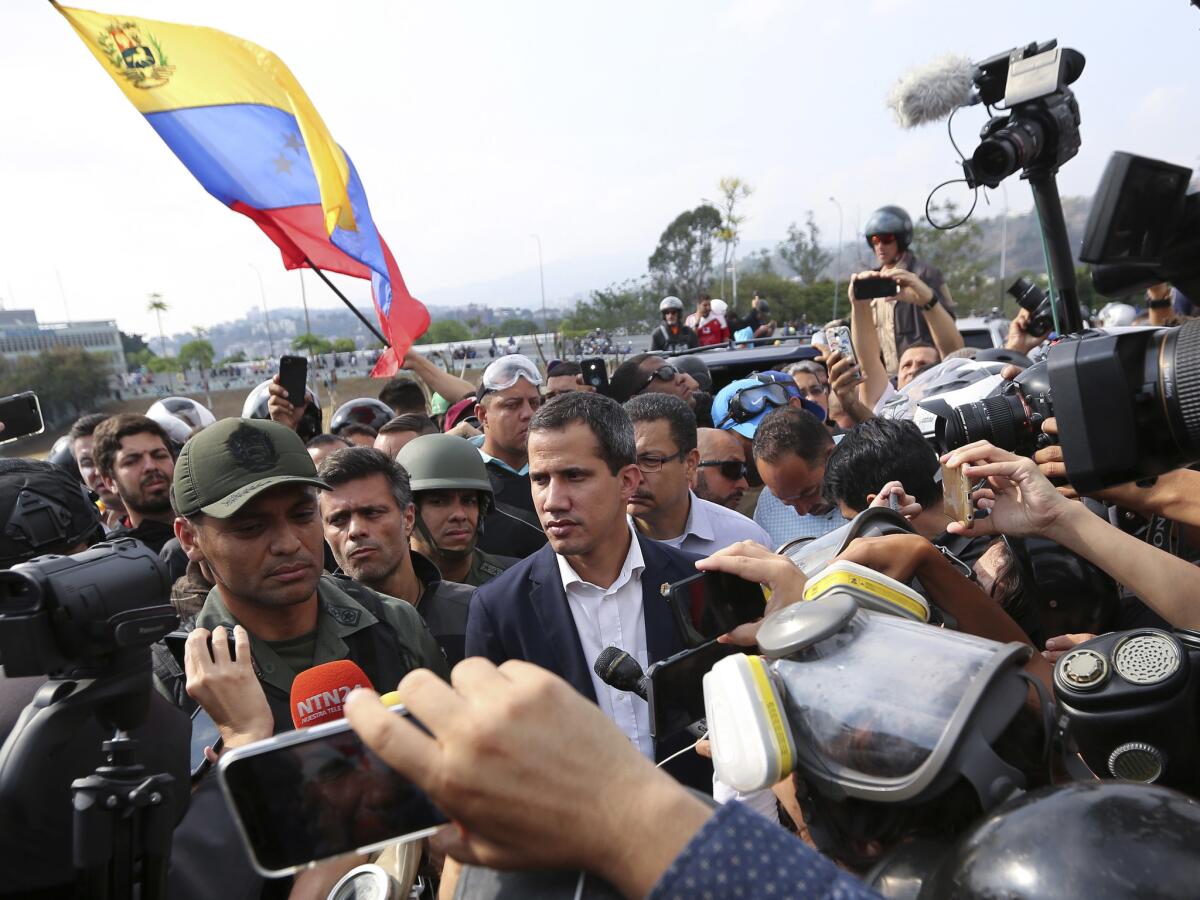
Earlier in the day, Padrino, the defense minister, had gone on state TV on the Maduro government’s behalf. He said a “very small group of soldiers and police officials” had seized government vehicles and arms in Caracas; he called it an attempted coup and said the soldiers had been “tricked.”
“This violent attempt against the peace has been defeated,” Padrino said.
Soon after Bolton’s statement, U.S. special representative for Venezuela Elliott Abrams said that the senior officials Bolton spoke of had not lived up to their commitments to “restore constitutional order.”
Abrams brushed off suggestions that, by publicly naming the three high-ranking Venezuelan officials, U.S. authorities were exposing the three to danger. He said the purported negotiations between Guaido’s representatives and the men — all long regarded as staunch Maduro loyalists — included provisions to retain their current positions, presumably in a post-Maduro government. Abrams said the U.S. was not involved in the talks. The situation in Venezuela, he said, “remains confused.”
Geoff Ramsey, an expert on Venezuela at the Washington Office on Latin America, said he had doubts about just how close Padrino and the others were to flipping in Guaido’s favor, noting that these are officials with deep ties in the Maduro government. Padrino, especially, has at least outwardly appeared entirely loyal to Maduro.
“I think this is a tactic [by the U.S. officials] to instill fear and division inside the regime,” Ramsey said, adding that it would play on Maduro’s paranoia, convincing him that his circle is “getting smaller by the minute.”
In eastern Caracas, an opposition bastion, protesters were tossing rocks and Molotov cocktails at security forces, who responded from armored vehicles with volleys of tear gas and blasts of water cannons.
Video from a protest site in the area showed an armored vehicle crashing into a crowd of protesters, who then appeared to attack the vehicle with a Molotov cocktail. Videos on Twitter also appeared to show protesters breaching a fence at the air force base.
Some 70 civilians were wounded during the day’s confrontations, but none died, according to a clinic in eastern Caracas. Five military service members were wounded, two critically, according to Maduro, who accused the opposition of using arms, including four machine guns, during the protest. Some 80 demonstrators were arrested across the country, according to Foro Penal, a nonprofit group that tracks detentions.
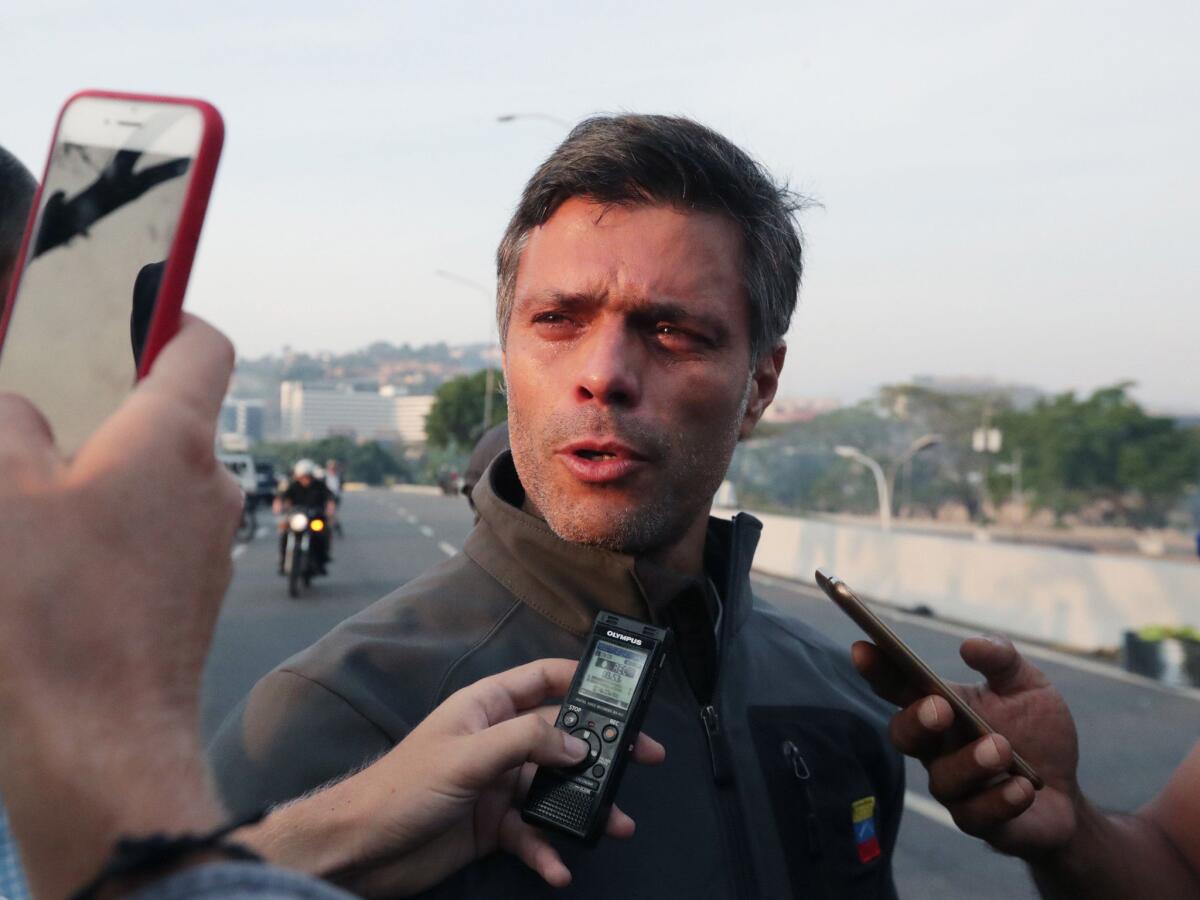
Appearing alongside Guaido on Tuesday was his political patron, Leopoldo Lopez, who said he had been freed from house detention by pro-opposition military officials.
Lopez, founder of Venezuela’s Popular Will party, of which Guaido is a member, called on all Venezuelans to “take to the streets” against Maduro.
Later, Lopez, his wife and daughter were taken in as “guests” at the Chilean diplomatic mission in Caracas, then moved to the Spanish Embassy. Chilean Foreign Minister Roberto Ampuero tweeted that they are Spanish descendants, and added: “This is a personal decision, considering that our embassy already had guests.”
Amid the fast-moving events, Maj. Gen. Jesus Rafael Suarez Chourio, Venezuela’s army chief, issued a Twitter message early Tuesday declaring his “absolute loyalty” to Maduro, who is also the military commander in chief. “They cannot divide our people with deceit to comply with unpatriotic interests,” the general tweeted. “North American imperialism will never vanquish us.”
Guaido has previously urged the military to abandon Maduro, and more than 1,000 soldiers and national guard members had been reported seeking asylum in Colombia. But the effectiveness of this most recent call to abandon Maduro remains uncertain.
The Trump administration, Guaido’s biggest backer, has levied numerous economic sanctions against Maduro, members of his government and inner circle, and crucial revenue sources such as the oil and gold-exportation industries.
Trump commented several times on Twitter on the situation in Venezuela, at one point taking aim at Cuba, which has been a major supporter of Maduro’s government.
“If Cuban troops and Militia do not immediately CEASE military and other operations for the purpose of causing death and destruction to the Constitution of Venezuela, a full and complete … embargo, together with highest-level sanctions, will be placed on the island of Cuba,” Trump wrote. “Hopefully, all Cuban soldiers will promptly and peacefully return to their island!”
In Washington, Carlos Vecchio, whom Guaido appointed as his representative to the United States, told reporters: “This is the beginning of the end.”
Vecchio called on Venezuelans to fill the streets and asked for the military to join “this inevitable process of change,” and then addressed Maduro: “The time has come to leave power; it is time for your ambition to cease taking Venezuela to more suffering.”
A nation with two presidents: How a political crisis has unfolded in Venezuela »
Colombian President Ivan Duque reiterated Guaido’s call to the Venezuelan military to abandon Maduro. Meanwhile, Bolivian President Evo Morales expressed support for Maduro.
Duque has led several South American nations in their call for Maduro to step aside. Colombia has received an estimated 1.2 million Venezuelan immigrants in recent years, the biggest share among receiver nations of the 4 million Venezuelans who have fled their country since Chavez took power in 1999.
Special correspondents Mogollon and Kraul reported from Caracas and Bogota, Colombia, respectively. Times staff writers McDonnell and Wilkinson reported from Mexico City and Washington, respectively. Special correspondent Cecilia Sanchez in Mexico City contributed to this report.
More to Read
Sign up for Essential California
The most important California stories and recommendations in your inbox every morning.
You may occasionally receive promotional content from the Los Angeles Times.
